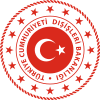Fatin Rüştü Zorlu
 From Wikipedia the free encyclopedia
From Wikipedia the free encyclopedia
This article needs additional citations for verification. (October 2010) |
Fatin Rüştü Zorlu | |
|---|---|
 | |
| Turkish Foreign Minister | |
| In office 25 November 1957 – 27 May 1960 | |
| Preceded by | Mehmet Fuat Köprülü |
| Succeeded by | Selim Sarper |
| Turkish Deputy Prime Minister | |
| In office 17 May 1954 – 29 July 1955 | |
| Preceded by | Samet Ağaoğlu |
| Succeeded by | Mehmet Fuat Köprülü |
| Personal details | |
| Born | 20 April 1910 Istanbul, Ottoman Empire |
| Died | 16 September 1961 (aged 51) İmralı Prison, İmralı, Turkey |
| Cause of death | Execution by hanging |
| Spouse | Emel Aras |
| Children | 1 |
Fatin Rüştü Zorlu (20 April 1910 – 16 September 1961) was a Turkish diplomat and politician. He was executed by hanging after the coup d'état in 1960 along with two other politicians.
Early life and education[edit]
He was born on 20 April 1910 in Istanbul to a family originating from the village of Zor, Artvin in northeastern Turkey. After finishing high school at Galatasaray High School, Zorlu was educated in political science at the Institut d'études politiques de Paris, France and in law at the University of Geneva, Switzerland.
Political career[edit]
Returning to Turkey, Zorlu began his career as a diplomat in 1932 in the Ministry of Foreign Affairs. From 1938 on, he served at various posts in embassies and consulates in Bern (Switzerland), Paris (France), Moscow (USSR), Beirut (Lebanon) and at the ministry in Ankara as well. Following Turkey's joining of NATO on 18 February 1952 he was appointed ambassador to NATO at the Supreme Headquarters Allied Powers Europe in Paris.
In 1954, Zorlu entered politics and was elected into the Turkish Grand National Assembly as the deputy of Çanakkale for the Democratic Party. He served as deputy prime minister between 1954 and 1955 and as minister of state in 1955. In 1955 he was also acting minister of foreign affairs and participated in the Tripartite Conference on Cyprus problem in London in June that year.[1] Zorlu left the office in the late 1955. He, Sıtkı Yırcalı and Hasan Polatkan were investigated by a Parliamentary commission in January 1956 due to the allegations of their involvelment in importing East German trucks and tires of no value and a general neglect of their duty.[2]
Zorlu was appointed minister for foreign affairs in 1957 and held the post until 27 May 1960 when the Turkish Armed Forces staged a coup and ousted the government of Prime Minister Adnan Menderes. In 1959 he participated along with Adnan Menderes in the Bilderberg Meeting in Yeşilköy, Turkey. It is rumoured that the coup might have something to do with that meeting.
During his tenure as minister of foreign affairs Turkey applied for the membership of the European Economic Community in 1959.[3]
Arrest and execution[edit]
He was arrested along with other party members, charged with violating the constitution, and put on trial on the island of Yassıada. His roommate in the Yassıada prison was Celal Yardımcı, a fellow party member and minister of justice.[4] He and Menderes were accused by the court of planning the Istanbul Pogrom. Though both of them rejected the claims, it is believed by scholars that Menderes assented to the organization of protests in İstanbul against the Greeks, but the extent of knowledge of Zorlu, who had been in London for the conference, is unclear. According to Zorlu's lawyer at the Yassiada trial, a mob of 300,000 was marshaled in a radius of 40 miles (60 km) around the city for the attacks.[5]
Zorlu was sentenced to death and executed by hanging on the island of İmralı on 16 September 1961 along with Adnan Menderes and Hasan Polatkan. He approached the gallows calmly, helped the hangman to lay the noose around his neck.[6]
Personal life[edit]
Zorlu married Emel Aras on 29 October 1933.[7] She was the daughter of Tevfik Rüştü Aras who was serving as the minister of foreign affairs at that time.[7] Fatin Rüştü Zorlu and Emel Aras had a daughter, Sevin Zorlu (1936–2006), who was a journalist.[8]
Legacy[edit]
Many years after his death his grave was moved to a mausoleum in İstanbul on 17 September 1990 along with the graves of the two other cabinet members hanged.
See also[edit]
References[edit]
- ^ Muzaffer Goksenin (December 1957). "The Cyprus Issue". Pakistan Horizon. 10 (4): 208. JSTOR 41392386.
- ^ "Developments of the Quarter: Comment and Chronology". The Middle East Journal. 10 (2): 193. 1956. JSTOR 4322801.
- ^ Soli Özel (2008). "A Passionate Story with Europe". European Security. 17 (1): 50. doi:10.1080/09662830802503706. S2CID 153390535.
- ^ Esma Torun Çelik (2020). "Yassıada duruşmalarında Ağrı milletvekili Hüseyin Celal Yardımcı". Tarih Okulu Dergisi (in Turkish). 49: 3818. doi:10.29228/joh.45867. S2CID 235014695.
- ^ Speros Vryonis (2005). The Mechanism of Catastrophe: The Turkish Pogrom of September 6-7, 1955, and the Destruction of the Greek Community of Istanbul. greekworks.com. p. 225. ISBN 978-0-9747660-3-4.
- ^ Hudgins, Graven (18 September 1960). "Turks hang ex-Premier Menderes". The Atlanta Constitution. p. 3.
- ^ a b "Kronolojik Tarih 1933". İşte Atatürk (in Turkish). Retrieved 21 November 2022.
- ^ "Fatin Rüştü Zorlu'nun Kızı Toprağa Verildi". Haberler (in Turkish). 2 November 2006. Retrieved 21 November 2022.
External links[edit]
 Media related to Fatin Rüştü Zorlu at Wikimedia Commons
Media related to Fatin Rüştü Zorlu at Wikimedia Commons- Biyografi.info - Biography of Fatin Rüştü Zorlu (in Turkish)

